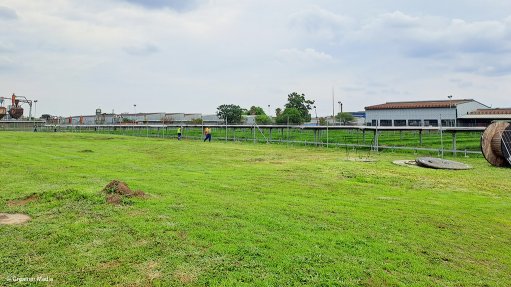
A solar photovoltaic plant has been installed at Nestlé's Babelegi factory, in Hammanskraal
Food and beverage company Nestlé's East & Southern Africa Region (ESAR) has installed a 966 kW ground-mounted solar photovoltaic (PV) power plant at its Babelegi manufacturing plant, in Hammanskraal, Gauteng.
The 1 806 PV panels are expected to deliver about 2.1-million kilowatt-hours of energy a year, which equates to 15.6% of the total electrical energy requirement of the factory, which manufacturers Cremora coffee creamer and Maggi two-minute noodles, for the full year.
The investment in renewable energy is in line with the Nestlé group’s 2030 ambition of zero environmental impact by its operations, and to achieve net-zero emissions by 2050.
This is the second manufacturing plant in the ESAR to install solar PV capacity, with the installation of a 1 189 kW plant at the Harrismith factory having been completed in August.
At Harrismith, the 1 946 solar PV panels are expected to deliver about 1.7-million kilowatt-hours of energy a year, which equates to 10% of the total electrical energy requirement of the factory for the full year. The system will generate aobut 45% of the factory’s demand during daylight hours.
While the Harrismith plant has a bigger installed capacity, it was noted during a media tour on November 22 that the Babelegi plant is more efficient, owing to the panels having the capability to follow the sun’s movements.
“One of the key messages coming out of the COP27 climate conference was the importance of action and implementation to advance climate action. As a business we firmly believe that taking action, however big or small, throughout our value chain, is how we will begin to make an impact on the climate crisis.
“We also believe that there is an opportunity to decrease greenhouse-gas emissions through an increase in renewable energy. Nestlé commits to having a strategy to procure 100% of electricity from renewable sources within the shortest practical timescale. The first phase of the renewable projects, pegged to deliver just over 3% of Nestlé ESAR's power requirements, has gone online,” says Nestlé ESAR technical director Xolile White.
The second phase of Nestlé ESAR's renewable energy programme will result in solar installations at its operations in East London, Estcourt and Potchefstroom, as well as at the Nestlé Quality Assurance Centre, in Johannesburg. These are expected to deliver a total combined capacity of 5.7 GW, which is 5% of Nestlé ESAR’s energy requirements.
Other renewable energy options will be explored to add to this capacity, including biogas, and partnership with independent power producers.
“In this critical moment for our planet, we are committed to finding solutions that deliver tangible results to the business. Therefore, we are multidisciplinary in our approach, aiming to transform many touchpoints across our value chain. From the energy we use in our operations as seen with this initiative, to carbon capture technology that converts flue gases to green products, to regenerative agriculture practises that reduce emissions.
“All these interventions, together, form our renewable energy sustainability initiative with the pillars of REthink, REduce and REpurpose. This renewable energy intervention is part of our intentional strides towards reducing carbon emissions across our manufacturing value chain to net zero by 2050,” White indicates.
Other sustainability endeavours at the Babelegi site, from 2018 to this year, include a 30% reduction in water usage, 100 t of plastic eliminated in quantity, and 447 t of plastic recyclability improved.
The factory is also 0% waste-to-landfill, with this being the case even prior to 2018.
Moreover, it was noted that this sustainability push had also resulted in an increase in output.